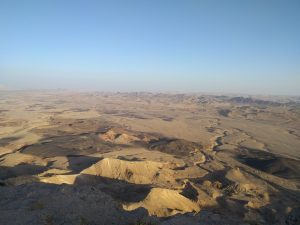
See – I have placed the Land before you. Come, possess the Land that Hashem swore to your forefathers – to Avrohom, Yitzchok, and Yaakov – to give them and their children after them.[2]
Did this really happen? The avos remained foreigners, passing through or settling on land that belonged to other peoples! The Land had hardly been placed before them as theirs.
To explain this, we must first understand the role of the avos. Simply put, they are the structure that maintains the world. How? They hewed so perfectly to different midos of Hashem, that they can be completely identified with those midos. And how those midos are applied in different places and times determines how Divine providence oversees the course of events in those places and times.
The generation that left Egypt responded to the many miracles and wonders that Hashem showed them by reciprocating with fierce love for Him. They followed Him out of Egypt to the wilderness, without provisions for themselves or their families, evincing their firm love and trust in Him.
In other words, they latched on to ahavah, the midah of Avraham. In turn, Hashem related to them with ahavah, sustaining them miraculously for decades. For their part, they channeled Avraham’s way of displaying love for Hashem. He did so by championing belief in Him, and teaching about Him far and wide. By receiving the Torah and living a miraculous existence, they, too, promoted Hashem’s existence and power to a watching world. And since they opted for ahavah to express their relationship with HKBH, He used that midah, and continued to employ it the entire period before and during the days of the First Temple. They subdued their enemies, and saw many miracles in the beis hamikdosh.
This changed drastically during the Second Temple period. When allowed to return after the Babylonian exile, they did not triumphantly return en masse. Instead, a paltry number came back to the Land. There was no great display of passion for Hashem; their ardor had been cooled. The ahavah that was left in them was a broken love, and directed in the wrong place – as in their marriage to non-Jewish women.
What did they respond to? To din. When Ezra chastised them and exhorted them to give up their foreign wives, they listened. Effectively, they opted for yir’ah, Yitzchok’s midah. Hashem’s hanhagah of them shifted as well – to din, which means containment and boundaries. Thus, the period was marked by din and tzimtzum. Gone, in large part, were the everyday miracles in the beis hamikdosh. Those miracles, which were evidence of Hashem’s love for His people, were removed, as His love was now constrained and circumscribed.
Having seized upon midas hadin, the midah of Yitzchok, was not a terrible thing. The challenge was to find a way to reclaim some of the lost midas haahavah of Avraham, and join it to din. Had Klal Yisrael done that, they would have joined chesed and gevurah, and produced the rachamim of Yaakov – something we have still not accomplished! Hashem would have responded with an outpouring of rachamim.
Alas, that is not what happened. They continued along with midas ha-din – and such was the Divine response! The stranglehold of the nations grew more severe. Aveiros mounted till a tipping point was reached, and the Churban was decreed. And it has been much the same since.
Returning to our pasuk, it begins with the word “see.” Not “hear,” or “understand,” but “see.” Seeing implies more clarity than the other words. In Moshe’s times, it was ahavah that governed the way Hashem interacted with Klal Yisrael. The relationship was closer, more open and revealed. The Bnei Yisrael were able to see how all of the extraordinary events around them were fueled by the midah of Avraham. That would not be the case later in history, which would be governed by midas Yitzchok.
All this will be remedied in the days of Mashiach, when a stable equilibrium of ahavah and din will be reached. In the merit of Yaakov – who combined both – all galus will end. In retrospect, though, all will understand that history had already in Moshe’s days truly been “placed before” the avos and their midos.


